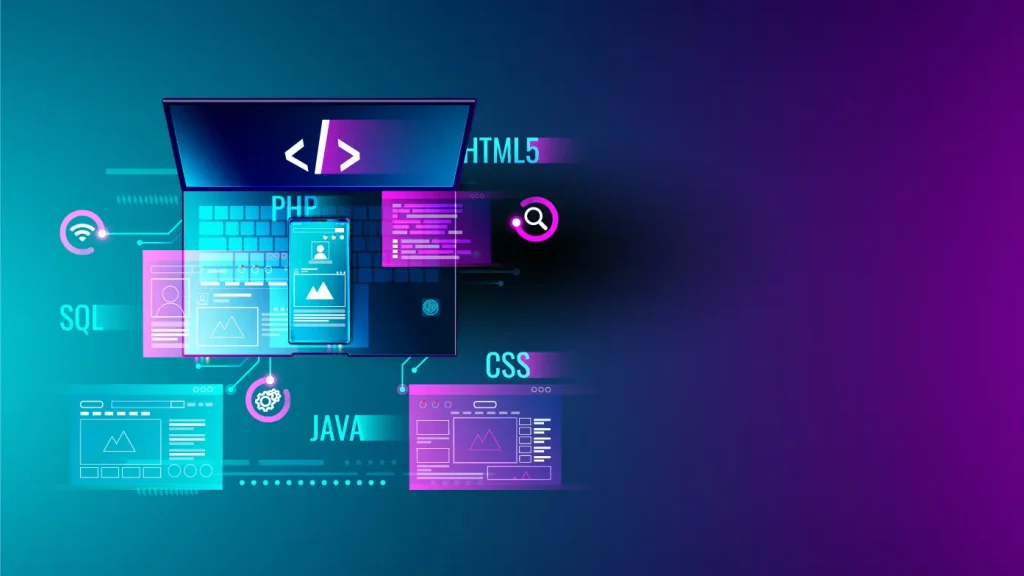
Best Frontend Frameworks for Web Development:
1. React.js
React, developed by Facebook, is a component-based library often categorized as a framework due to its vast ecosystem.
- Pros: Fast, highly customizable, backed by a massive community.
- Cons: Lack of structure (not opinionated), requires third-party tools for certain functionalities.
- Best For: Dynamic applications with interactive UIs.
2. Angular
Angular is a full-fledged framework developed by Google that supports powerful single-page applications.
- Key Features: Two-way data binding, dependency injection, powerful CLI.
- Pros: Great for large projects, extensive tooling.
- Cons: Steeper learning curve due to complexity.
- Best For: Enterprise applications that require robust solutions.
3. Vue.js
Vue is a progressive framework known for its ease of use and flexibility. It allows developers to incrementally adopt its features based on project needs.
- Strengths: Simple to learn, flexible, great for small to medium projects.
- Weaknesses: Smaller ecosystem compared to React and Angular.
- Best For: Interactive web applications, especially smaller projects.
4. Svelte
Svelte takes a different approach by compiling components to native JavaScript code, leading to smaller, faster applications.
- Unique Aspect: Doesn’t use a virtual DOM.
- Pros: Lightweight, fast performance.
- Cons: Smaller community, fewer resources.
- Best For: High-performance applications with limited resources.
5. Ember.js
Ember is an opinionated framework that encourages convention over configuration, making it an ideal choice for developers who want a solid, structured approach.
- Key Features: Built-in router, two-way data binding, and conventions.
- Pros: Robust CLI, developer-friendly tooling.
- Cons: Somewhat rigid structure.
- Best For: Complex web applications where stability is a priority.
6. Backbone.js
Backbone provides the minimal structure needed for building complex applications, using an MVC architecture.
- Advantages: Lightweight, flexible.
- Disadvantages: Requires additional plugins to achieve full functionality.
- Best For: Projects that need a minimal framework with MVC support.
Comparison of Top Frontend Frameworks
| React | Moderate | Large | High | Dynamic and interactive UIs |
| Angular | Steep | Large | High | Large-scale applications |
| Vue | Easy | Moderate | Medium | Smaller projects |
| Svelte | Moderate | Small | High | High-performance apps |
| Ember | Steep | Small | Medium | Stable, structured apps |
| Backbone | Moderate | Small | Medium | Minimalist MVC apps |
How to Choose the Best Framework for Your Project
When it comes down to choosing, align the framework’s capabilities with your project’s needs. If you’re building a highly interactive interface, React or Vue might suit you best. For large, data-heavy applications, Angular’s structured approach could be ideal.
The Future of Frontend Frameworks
As technology advances, frontend frameworks are evolving, integrating newer features like server-side rendering and improved state management. The push towards simpler, more performant solutions continues, with frameworks like Svelte leading the way.
Conclusion
Frontend frameworks can make or break your web development project. By carefully evaluating your project needs, team expertise, and the specific features of each framework, you can select the best tool to bring your vision to life. Remember, the best frontend framework isn’t just about popularity—it’s about the features that help you build the best experience for your users.
FAQs
- What is the easiest frontend framework to learn for beginners?
Vue.js is often regarded as the most beginner-friendly, with its gentle learning curve and simple structure. - Which frontend framework is best for large-scale applications?
Angular is well-suited for large, complex applications due to its robust structure and powerful CLI. - Are frontend frameworks suitable for mobile development?
Yes! Frameworks like React have libraries like React Native for mobile development. - How often should I update my frontend framework?
Regular updates are recommended to stay secure and performant. Following the community’s guidance helps avoid compatibility issues. - What are the best resources to learn frontend frameworks?
Documentation sites, courses on platforms like Udemy or Coursera, and open-source projects are great places to start.







